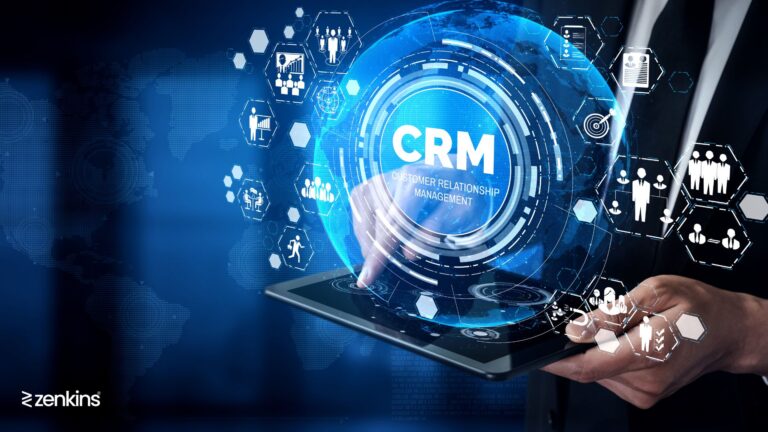Healthcare CRM Software: Improving Patient Relationships and Outcomes
Table of Contents
In today’s rapidly evolving healthcare landscape, the importance of nurturing strong patient relationships cannot be overstated. Healthcare CRM software serves as a powerful tool that allows healthcare providers to effectively manage and improve patient interactions, ultimately leading to enhanced outcomes.
This article explores the role and benefits of implementing healthcare CRM software, highlighting how it can enhance patient engagement, streamline communication, leverage data analytics, and improve overall patient care. Additionally, it delves into the challenges and considerations associated with implementing CRM systems in healthcare settings and provides insights into future trends and innovations in this field. By harnessing the potential of healthcare CRM software, healthcare organizations can forge deeper connections with patients, optimize care delivery, and drive positive health outcomes.
Introduction to Healthcare CRM Software
Understanding CRM in the Healthcare Industry
In a world where customer relationship management (CRM) has become a buzzword in various industries, healthcare is no exception. But what exactly does CRM mean in the context of healthcare? Well, it’s all about improving patient relationships and outcomes through the use of software and technology.
The Role of CRM in Patient Relationship Management
Patient relationship management is crucial in healthcare, as it involves not only providing quality medical care but also building trust and loyalty with patients. This is where healthcare CRM software comes into play. It helps healthcare providers manage interactions with patients, streamline communication, and deliver personalized care.
Benefits of Implementing Healthcare CRM Software
Enhancing Efficiency and Productivity
Implementing healthcare CRM software can significantly boost efficiency and productivity within healthcare organizations. With features like streamlined appointment scheduling, automated documentation, and centralized data management, healthcare providers can save time and focus on delivering better care to patients.
Improving Patient Satisfaction and Loyalty
Happy patients are more likely to stay loyal to their healthcare providers. CRM software allows for personalized communication, timely follow-ups, and proactive engagement, leading to improved patient satisfaction and increased loyalty. When patients feel cared for and valued, they are more likely to recommend their healthcare providers to others.
Increasing Revenue Generation and Cost Savings
While healthcare CRM software is primarily focused on improving patient outcomes, it also has financial benefits. By optimizing operations, reducing missed appointments, and targeting marketing efforts effectively, healthcare organizations can increase their revenue generation. Additionally, CRM software can help identify cost-saving opportunities and eliminate inefficient processes.
Enhancing Patient Engagement with CRM Solutions
Implementing Patient Portals and Self-Service Options
Healthcare CRM solutions enable the implementation of patient portals and self-service options, empowering patients to take control of their health. Through these platforms, patients can access their medical records, schedule appointments, request prescription refills, and communicate with their healthcare providers conveniently.
Utilizing Automated Appointment Reminders and Notifications
Forgetfulness is a common human trait, and missed appointments can be a hassle for both patients and healthcare providers. With CRM software, automated appointment reminders and notifications can be sent via email, text messages, or even phone calls, reducing no-shows and ensuring that patients are aware of their upcoming appointments.
Personalizing Patient Communication and Education
Every patient is unique, and effective communication is crucial to ensure they receive the right care. Healthcare CRM software allows for personalized communication and education tailored to each patient’s needs. Whether it’s sending targeted educational content or providing tailored recommendations, personalized communication enhances patient engagement and promotes better health outcomes.
Improving Patient Care and Outcomes through CRM Technologies
Facilitating Seamless Care Coordination and Collaboration
Efficient care coordination and collaboration among healthcare professionals can significantly improve patient outcomes. CRM technologies enable seamless communication and data sharing between different healthcare departments, ensuring that everyone involved in a patient’s care is on the same page.
Enabling Proactive Patient Monitoring and Intervention
With healthcare CRM software, healthcare providers can proactively monitor patient data and intervene when necessary. By tracking key health indicators and leveraging automated alerts, healthcare professionals can identify potential issues early on, prevent complications, and provide timely interventions.
Integrating EHR Systems for Comprehensive Patient Insights
EHR (Electronic Health Record) systems are at the core of modern healthcare, and integrating them with CRM software enhances patient care. By accessing comprehensive patient insights, including medical history, medication records, and test results, healthcare providers can make informed decisions and provide more personalized and effective care.
Streamlining Patient Communication and Relationship Management
Centralizing Patient Communication Channels
Keeping track of patient communication can be a challenge in a busy healthcare environment. With healthcare CRM software, healthcare providers can centralize all patient communication channels in one platform. No more juggling between emails, phone calls, and messages scattered across different systems. Everything can be accessed and managed in one place, making it easier to stay organized and respond promptly to patient inquiries.
Managing and Tracking Patient Interactions
Effective patient relationship management involves understanding each patient’s needs and preferences. A healthcare CRM system allows healthcare providers to keep track of patient interactions, including appointments, inquiries, and feedback. With this information readily available, healthcare professionals can provide personalized care and ensure that no patient falls through the cracks.
Automating Follow-ups and Feedback Collection
Following up with patients and collecting their feedback is crucial for improving patient satisfaction and outcomes. Healthcare CRM software can automate these processes, sending out reminders for upcoming appointments and collecting feedback through surveys. This automation saves time for healthcare providers and ensures that patients feel heard and valued.
Leveraging Data Analytics for Personalized Patient Care
Utilizing Patient Data for Segmentation and Targeting
Healthcare CRM software allows healthcare providers to leverage patient data for segmentation and targeting. By analyzing data such as demographics, medical history, and preferences, providers can create personalized communication and treatment plans. This targeted approach enhances patient engagement and satisfaction.
Predictive Analytics for Early Detection and Prevention
Predictive analytics is a powerful tool in healthcare CRM software that can help detect patterns and predict potential health risks. By analyzing patient data, such as vital signs, lab results, and lifestyle factors, healthcare providers can identify individuals at higher risk for certain conditions. Early detection and preventive interventions can then be implemented, improving patient outcomes and reducing healthcare costs.
Monitoring Patient Feedback and Sentiment Analysis
Patient feedback is a valuable source of insights for healthcare providers. Healthcare CRM software can automatically collect and analyze patient feedback, including reviews and surveys. Sentiment analysis can identify trends and sentiments towards specific aspects of care, helping providers identify areas for improvement and address patient concerns more effectively.
Challenges and Considerations in Implementing Healthcare CRM Software
Ensuring Data Security and Privacy Compliance
Managing patient data comes with the responsibility of ensuring data security and privacy compliance. Healthcare providers must carefully select CRM software that meets industry standards and regulations, such as HIPAA. Implementing robust security measures and providing staff training on data privacy are essential.
Addressing Staff Training and Adoption Challenges
Introducing new software can be met with resistance from staff members. It’s crucial to address any training and adoption challenges when implementing healthcare CRM software. Providing comprehensive training, emphasizing the benefits of the system, and involving staff in the decision-making process can help increase staff buy-in and adoption rates.
Integrating CRM Systems with Existing IT Infrastructure
Integrating healthcare CRM software with existing IT infrastructure can be a complex task. Ensuring compatibility and seamless data exchange between different systems is vital. Healthcare providers should carefully plan the integration process and involve IT experts to ensure a smooth transition.
Future Trends and Innovations in CRM for Healthcare
Artificial Intelligence and Machine Learning in CRM
Artificial intelligence and machine learning are revolutionizing healthcare CRM. These technologies can analyze vast amounts of patient data, identify patterns, and make predictions. AI-powered chatbots and virtual assistants can also enhance patient interaction and support, providing personalized recommendations and answers to common inquiries.
Virtual Assistants and Chatbots for Patient Interaction
Virtual assistants and chatbots are becoming increasingly popular in healthcare CRM. These AI-powered tools can handle routine patient inquiries, appointment scheduling, and basic medical advice. They can free up staff time, improve accessibility, and provide timely responses to patient needs.
Continuous Enhancements in Personalization and Customization
As technology advances, healthcare CRM software will continue to evolve with increased personalization and customization features. Providers will have more options to tailor their communication and treatment plans according to individual patient preferences, leading to higher patient satisfaction and engagement.
Conclusion
In conclusion, healthcare CRM software is revolutionizing patient relationships and outcomes. By implementing CRM solutions, healthcare providers can enhance patient engagement, streamline communication, and leverage data analytics to personalize care. Despite challenges, the future of CRM in healthcare looks promising, with advancements in artificial intelligence, virtual assistants, and customization. As healthcare organizations continue to embrace CRM technologies, they pave the way for improved patient satisfaction, better care coordination, and ultimately, healthier patient populations.
The power of healthcare CRM software is undeniable, offering a path towards transforming healthcare delivery and achieving better patient outcomes. With the integration of EHR systems and seamless collaboration, healthcare providers can provide comprehensive, personalized care that leads to better patient outcomes. So, if you’re in the healthcare industry, it’s time to embrace the power of CRM and take patient care to the next level.
FAQ
What is healthcare CRM software and how does it work?
Healthcare CRM software is a technology solution designed to help healthcare providers effectively manage and improve patient relationships. It allows organizations to centralize patient data, automate communication, track interactions, and utilize data analytics for personalized care. By integrating various systems and functionalities, healthcare CRM software enhances patient engagement, care coordination, and overall patient outcomes.
What are the benefits of implementing healthcare CRM software?
Implementing healthcare CRM software offers numerous benefits. It helps enhance efficiency and productivity, improve patient satisfaction and loyalty, and increase revenue generation and cost savings. CRM solutions also enable healthcare providers to streamline patient communication, personalize patient care, and leverage data analytics for proactive intervention and personalized treatment planning.
What challenges should be considered when implementing healthcare CRM software?
While healthcare CRM software offers significant advantages, there are challenges to consider. Ensuring data security and privacy compliance is paramount, as healthcare organizations deal with sensitive patient information. Staff training and adoption can also be challenging, as employees need to be equipped with the necessary skills to effectively use the CRM system. Additionally, integrating the CRM software with existing IT infrastructure can pose technical challenges that need to be addressed.
What are the future trends and innovations in healthcare CRM?
The future of healthcare CRM is exciting, with several trends and innovations on the horizon. Artificial intelligence and machine learning are expected to play a significant role in CRM, enabling personalized recommendations, predictive analytics, and optimized patient interactions. Virtual assistants and chatbots are becoming increasingly prevalent, providing 24/7 patient support and automating routine tasks. Continuous advancements in personalization and customization will further enhance the patient experience and improve overall healthcare outcomes.




